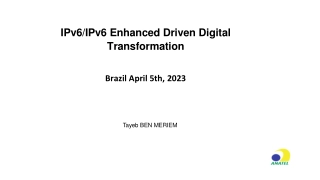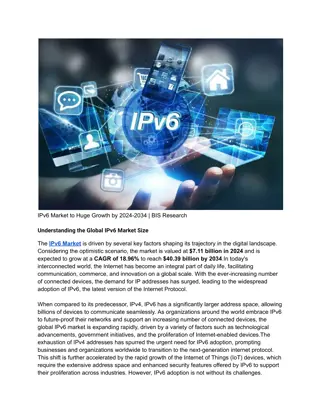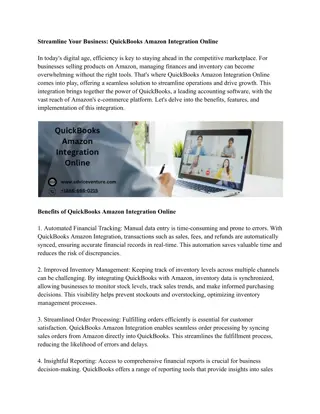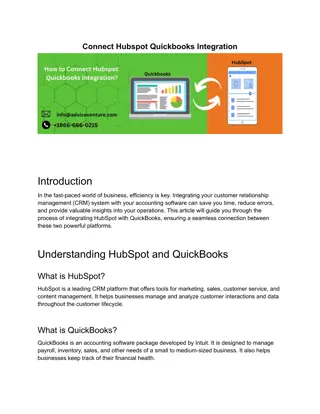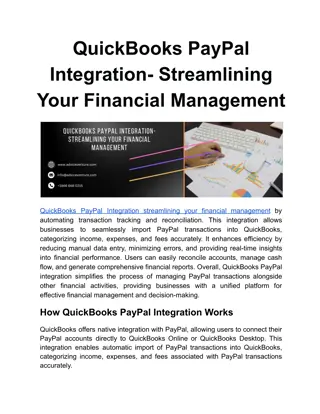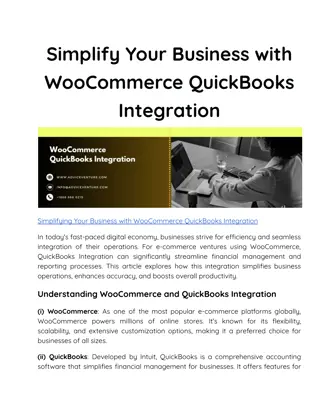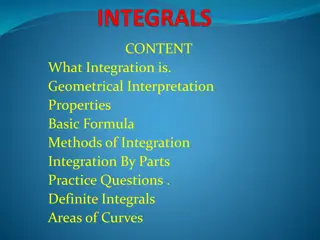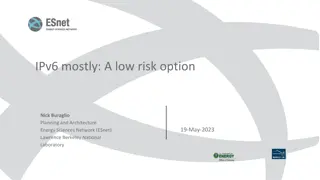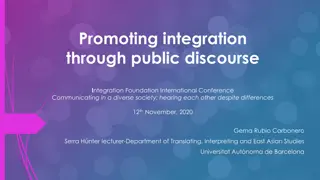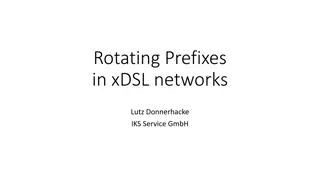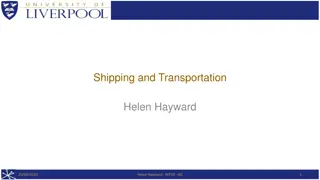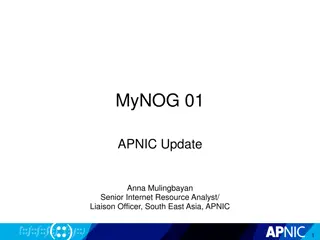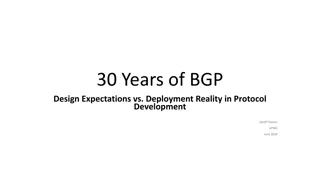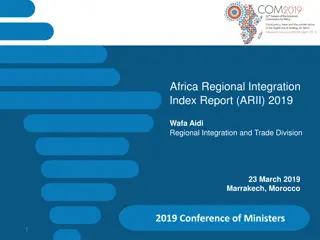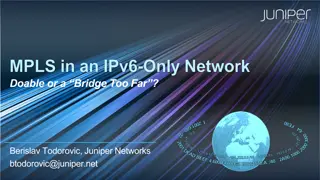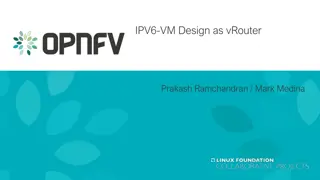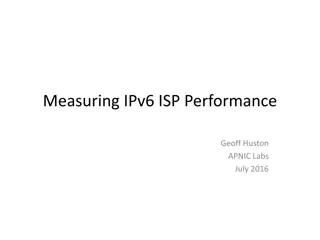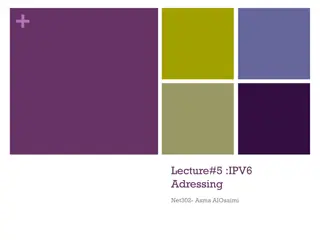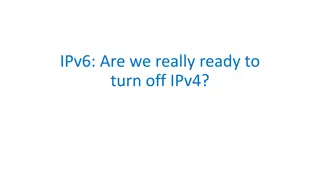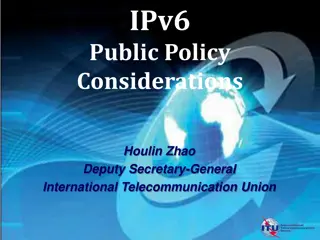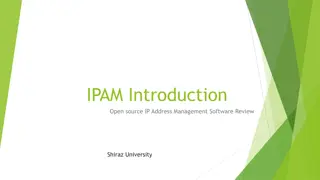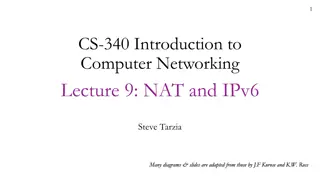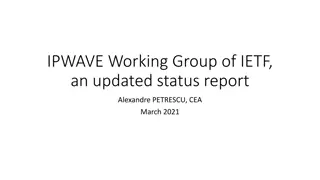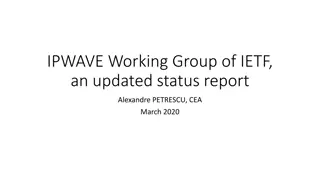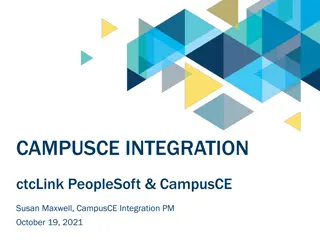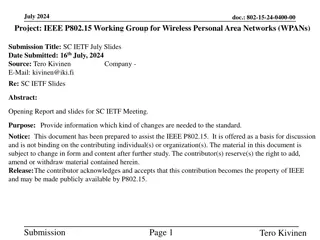IPv6 Enhanced: Key Value for Digital Transformation
Explore how IPv6 plays a crucial role in driving digital transformation, with a focus on policies, societal impact, business opportunities, and stakeholders involved in creating a policy-driven ecosystem for a more inclusive and secure digital society.
0 views • 20 slides
IPv6 Market to Huge Growth by 2024-2034 _ BIS Research
The IPv6 Market is driven by several key factors shaping its trajectory in the digital landscape. Considering the optimistic scenario, the market is valued at $7.11 billion in 2024 and is expected to grow at a CAGR of 18.96% to reach $40.39 billion by 2034.
5 views • 3 slides
QuickBooks Amazon Integration Online
QuickBooks Amazon Integration Online comes into play, offering a seamless solution to streamline operations and drive growth. This integration brings together the power of QuickBooks, a leading accounting software, with the vast reach of Amazon's e-commerce platform. Let's delve into the benefits, f
1 views • 3 slides
Connect Hubspot Quickbooks Integration
Connect Hubspot Quickbooks Integration\nIntegrating HubSpot with QuickBooks streamlines your business operations by automating data sync between your CRM and accounting software. This integration enhances data accuracy, improves customer insights, and simplifies financial processes. You can achieve
0 views • 8 slides
QuickBooks PayPal Integration- Streamlining Your Financial Management
QuickBooks PayPal Integration streamlining your financial management by automating transaction tracking and reconciliation. This integration allows businesses to seamlessly import PayPal transactions into QuickBooks, categorizing income, expenses, and fees accurately. It enhances efficiency by reduc
4 views • 6 slides
Simplify Your Business with WooCommerce QuickBooks Integration
In today's fast-paced digital economy, businesses strive for efficiency and seamless integration of their operations. For e-commerce ventures using WooCommerce, QuickBooks Integration can significantly streamline financial management and reporting processes. This article explores how this integratio
2 views • 5 slides
Understanding Sensory Circuits Training and Integration
Explore the importance of sensory circuits training, sensory integration needs, and the impact on sensory processing. Learn about the various sensory systems, components of sensory integration, and the challenges individuals may face with sensory processing difficulties. Discover strategies to suppo
0 views • 24 slides
Understanding IPv6 Addressing and Migration Techniques
IPv6 is designed as the successor to IPv4 due to the depletion of IPv4 address space. This lecture covers topics such as the need for IPv6, IPv4 and IPv6 coexistence techniques like dual-stack, tunneling, and translation, IPv6 addressing using the hexadecimal number system, and IPv6 address represen
0 views • 30 slides
Understanding Integration: Geometrical Interpretation, Properties, and Methods
Integration is the inverse process of differentiation, where we find a function whose differential is given. This process involves basic formulae, methods like integration by parts, and geometrical interpretation. Properties of indefinite integrals and techniques such as integration by substitutions
6 views • 28 slides
Assessment of Progress on Regional Integration in Africa: Key Messages and Recommendations
Regional integration in Africa remains vital for economic transformation, with progress and challenges highlighted in a technical report. The African Continental Free Trade Area (AfCFTA) is a significant milestone for boosting trade and market integration on the continent. Efforts are needed to addr
0 views • 5 slides
Evolution of Internet Protocol: From IPv4 to IPv6
The evolution of Internet Protocol (IP) from IPv4 to IPv6 has been crucial for adapting to new technologies and addressing specific networking challenges. IPv6 offers a 128-bit address space, improved header format, extensibility, and support for a wide range of services including video, voice, and
0 views • 23 slides
Leveraging IPv6-Mostly: A Low-Risk Option for Network Evolution
IPv6-mostly utilizes DHCP Option 108 to enable devices to operate in an IPv6-only mode, enhancing user experience while reducing risk. By leveraging modern technologies like 464XLAT and CLAT, the transition to IPv6 is seamless, with devices automatically adapting to the available network setup witho
0 views • 13 slides
Progress Report on Regional Integration in Africa
The document presents an assessment of progress on regional integration in Africa, highlighting challenges and achievements in advancing integration agendas. It emphasizes the importance of regional integration, particularly in the context of the AfCFTA, to foster economic transformation and resilie
1 views • 6 slides
Promoting Integration Through Public Discourse: International Conference Insights
Public discourse plays a crucial role in shaping societal perceptions of diversity and integration. The Integration Foundation International Conference delved into communicative practices that both promote and hinder integration, emphasizing the responsibility of public communicators in constructing
6 views • 15 slides
Insights on IPv6 Reliability Measurements by Geoff Huston at APNIC
Geoff Huston from APNIC conducted IPv6 reliability measurements in May 2019. The study involved comparing IPv4 and IPv6 connections, analyzing TCP connection failures, and highlighting success rates in specific networks like 464XLAT and Reliance JIO in India.
0 views • 29 slides
IPv6 Networking Considerations in xDSL Networks
Practical insights and challenges in implementing IPv6 networking in xDSL networks, discussing rotating prefixes, privacy implications, management of multiple prefixes, prefix size considerations, and strategies for DHCP and L2TP termination. The content also covers security measures, prefix rotatio
0 views • 11 slides
Transportation and Handling of Endcap C for Integration at CERN
Utilizing expertise in transporting SCT Endcap C, the project involves designing cradles for secure transportation minimizing integration work at CERN. Input required from CERN Integration team for tooling design. Detailed inspection before departure crucial. Tasks include reception, testing, connec
0 views • 10 slides
IPv6 Security and Threats Workshop Summary
David Kelsey from STFC-RAL presented on IPv6 security and threats at the IPv6 workshop pre-GDB at CERN in June 2016. The workshop covered topics such as IPv6 protocol attacks, issues for site network security teams and sys admins, new features of IPv6, security pros and cons, immediate IPv6 concerns
0 views • 29 slides
Understanding Integration: From Marginal Utility to Definite Numeric Solutions
Integration plays a crucial role in mathematics, connecting concepts such as marginal utility and total utility functions, differential coefficients, rules for indefinite integration, and the process of definite integration. Learn about notation, rules, and examples to grasp the fundamentals and app
0 views • 23 slides
Understanding IPv6 End Client Measurement Challenges
Adding IPv6 to your website can present risks, potentially impacting client accessibility. Learn about potential issues, measuring end-user behavior without website changes, and using APNIC's web measurement system for insights.
0 views • 27 slides
APNIC Internet Resource Analyst Update
Anna Mulingbayan, Senior Internet Resource Analyst and Liaison Officer at APNIC, provides updates on IP address and ASN delegation in the Asia-Pacific region. The content covers IPv4 exhaustion, delegation policies, last /8 delegations, and key policies implemented in 2011. Additionally, it discusse
0 views • 18 slides
Evolution of BGP: Expectations vs. Reality in Protocol Development
BGP has evolved over 30 years from its origins as an advancement of EGP in the 1980s to address issues like routing explosion, IPv6 integration, and imperfections such as session insecurity and protocol instability. Despite challenges, BGP remains a critical component of inter-domain routing, adapti
0 views • 10 slides
Africa Regional Integration Index Report 2019 Summary
The Africa Regional Integration Index Report 2019 presented at the Conference of Ministers in Marrakech, Morocco, highlights the framework, dimensions, indicators, and progress on regional integration in Africa. It focuses on aspects such as free movement of people, trade integration, infrastructura
0 views • 10 slides
Navigating IPv6 and MPLS Challenges for IPv4 Core Edge Transition
Explore the transition solutions and challenges for integrating IPv6 at the edge of an IPv4 core network, including 6PE, 6VPE, MPLS transport options, and the potential for IPv4 elimination. Discover the evolution toward IPv6 adoption in networking standards and the persistent role of MPLS in modern
0 views • 25 slides
Overview of vRouter Implementation in Openstack Neutron
Virtual router (vRouter) is a crucial component in network virtualization, with applications in cloud environments like Openstack Neutron. This article delves into the concept of vRouter, its importance in IPv6 implementations, and the utilization of VM-based vRouters. It also explores the current s
0 views • 12 slides
Understanding IPv6 ISP Performance: A Detailed Analysis by Geoff Huston
This comprehensive study explores the reliability and speed of IPv6 connections, highlighting factors affecting connection failures. It compares datasets from 2011 and 2015/2016, revealing insights on Teredo, 6to4, and unicast address failures. The findings underscore the importance of addressing is
0 views • 37 slides
Integration Landscape at Microsoft: Journey to Azure Logic Apps
Mayank Sharma and Divya Swarnkar, Senior Program Managers at Microsoft, discuss the current integration landscape at Microsoft, highlighting the transition to Azure Logic Apps. They emphasize the modernization of integration through metadata-driven flows and patterns for enhanced business agility an
0 views • 13 slides
Microsoft Integration Day - Cloud Automation and Platform Functionality
Explore the Microsoft Integration Day event held on September 10, 2016 in Bengaluru, focusing on cloud-based application integration, Azure services, Logic Apps for business process automation, various connectors, and upcoming integration capabilities. Discover the power of automating business proce
0 views • 20 slides
IPv6 Addressing and Coexistence: Overview and Challenges
This lecture covers essential topics on IPv6 addressing, including IPv4 issues, the need for IPv6, address representation, types, testing, and verification. It explains how IPv6 is designed to overcome the limitations of IPv4, particularly the depletion of the IPv4 address space. The discussion also
0 views • 44 slides
Evolution of IPv6 Adoption in the Networking Industry
IPv6 adoption has reached 30% globally by the start of 2022. However, progress varies among different sectors, with enterprises lagging behind consumer markets. The slow transition is attributed to market saturation, legacy network issues, and cost considerations. Despite the benefits of IPv6 deploy
0 views • 6 slides
Official Bilingualism and Monolingual Integration Policies in Finland
Official bilingualism in Finland between Finnish and Swedish is a crucial aspect of the country's integration policies. The challenges faced by monolingual integration and the importance of proficiency in the national languages for asylum seekers are highlighted. The role of language in integration,
0 views • 14 slides
The State of IPv6 Transition: Are We Ready to Turn Off IPv4?
Despite decades of effort, the transition from IPv4 to IPv6 has been slow. Currently stuck in Phase 2, with only a small percentage of Internet users having IPv6 capabilities. New deployments lean towards IPv6 but the majority still rely on IPv4, with gradual migrations to dual-stack for legacy netw
0 views • 49 slides
Understanding IP Addresses and Their Classification
IP Addresses, short for Internet Protocol addresses, are unique identifiers assigned to devices on a network. They can be IPv4 or IPv6, with IPv4 having 32 bits and IPv6 being 128 bits. IP addresses are classified into classes A, B, and C, each with specific range and usage. Understanding IP address
0 views • 14 slides
IPv6 Public Policy Considerations - Addressing the Global IP Address Shortage
In light of the global shortage of IPv4 addresses, there is a pressing need for a fair policy for the allocation of remaining addresses. The rapid growth of the Internet has further increased demand for IP addresses, with IPv4 expected to run out soon. The deployment of IPv6 has become a critical is
0 views • 23 slides
Comprehensive Review of IP Address Management Software at Shiraz University
IP Address Management (IPAM) is crucial for registering, tracking, and managing IPs efficiently. This open-source software integrates DNS and DHCP, aiding in growth strategies and transitioning to IPv6. By centralizing information, IPAM addresses challenges like IPv4 exhaustion, conflicting IPs, and
0 views • 26 slides
Understanding NAT and IPv6 in Computer Networking
This lecture covers Network Address Translation (NAT) and IPv6 basics in computer networking. It explains how NAT helps in connecting multiple devices to the internet with limited IPv4 addresses, the concept of public and private IP addresses, and the transition to IPv6 for addressing constraints. V
1 views • 31 slides
IPWAVE Working Group of IETF: Updated Status Report March 2021
The IPWAVE Working Group at IETF focuses on IP wireless access in vehicular environments, working on V2V and V2I use cases. They are currently emphasizing IPv6 over 802.11-OCB networks, with advancements towards higher bandwidth OCB implementations. The group's main work item involves running an IP
0 views • 10 slides
IPWAVE Working Group of IETF - Status Report March 2020
IPWAVE Working Group of IETF focuses on IP Wireless Access in Vehicular Environments, addressing V2V and V2I use cases. Key items include IPv6 over 802.11-OCB and Problem Statement and Use Cases perspectives. The group collaborates with ISO, SAE, ETSI, and IEEE. Major achievements include RFC 8691 p
0 views • 9 slides
CampusCE Integration Overview and Milestones
This collection provides an in-depth look at the integration of CampusCE with ctcLink PeopleSoft, detailing the phases of integration, creation of pages, set up of admin units and subjects, and milestones achieved by various colleges. The process involves building courses, adding fees, student enrol
0 views • 30 slides
Update on IEEE P802.15 Working Group for Wireless Personal Area Networks (WPANs)
The document provides an overview of the recent activities and upcoming events related to the IEEE P802.15 Working Group for Wireless Personal Area Networks (WPANs), including reports on past IETF meetings and details about the agenda for the upcoming IETF 120 in Vancouver. It describes the working
0 views • 17 slides
